| Srl | Item |
| 1 |
ID:
174909
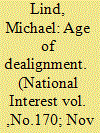

|
|
|
| 2 |
ID:
181593
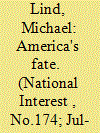

|
|
|
|
|
| Summary/Abstract |
For generations, Americans opposed to foreign wars have warned that they might result in the conversion of American society into a garrison state. But there are other ways in which foreign policy can undermine the economic, political, and social foundations of a democratic republic like the United States, to the point at which it becomes a different kind of regime.
|
|
|
|
|
|
|
|
|
|
|
|
|
|
|
|
| 3 |
ID:
076533
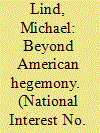

|
|
|
| 4 |
ID:
133789


|
|
|
|
|
| Publication |
2014.
|
| Summary/Abstract |
THE UNITED STATES OF AMERICA HAS lost its mind. To put it more precisely, the United States has lost its collective institutional memory. America achieved its present global preeminence by means of values and strategies that Washington's current bipartisan elite chooses to repress from memory or actively stigmatize. Foremost among the repressed memories in what Gore Vidal called the United States of Amnesia is nationalism-including self-confident, unapologetic American nationalism.
|
|
|
|
|
|
|
|
|
|
|
|
|
|
|
|
| 5 |
ID:
181577
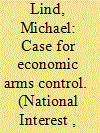

|
|
|
|
|
| Summary/Abstract |
The idea of global free trade as an end in itself is obsolete in a multipolar world of several great powers and shifting coalitions, in which today’s friendly trading partner may be tomorrow’s enemy determined to cut off essential supplies.
|
|
|
|
|
|
|
|
|
|
|
|
|
|
|
|
| 6 |
ID:
084600
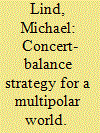

|
|
|
| 7 |
ID:
184506
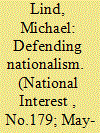

|
|
|
|
|
| Summary/Abstract |
THE TWENTY-FIRST century is the era of the nation-state. Today there are 193 members of the United Nations General Assembly, even though at the time of its formation, the UN had only fifty-one members. Where did those 142 members come from, in the last seventy-seven years? The new states were formed from the partition of former European empires like the British and French Empires, the disintegration of the Soviet Union, which was the successor state to the Romanov Russian Empire, and in some cases, like those of Yugoslavia and Sudan, the disintegration of post-colonial successor states into even smaller states.
|
|
|
|
|
|
|
|
|
|
|
|
|
|
|
|
| 8 |
ID:
144647
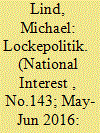

|
|
|
|
|
| Summary/Abstract |
TODAY THE practice as well as the theory of foreign policy is divided between the traditions of liberalism and realism (or realpolitik). Ever since the UN Universal Declaration of Human Rights in 1948, international politics has been influenced by the discourse of “human rights,” rooted in the tradition of natural-rights philosophy that dates back to the seventeenth-century British philosopher John Locke. The idea of human or natural rights is commonly identified with the liberal tradition in foreign affairs. The liberal tradition, favoring international organization, international law, free trade and national self-determination, is often identified with Locke as well as with Adam Smith and Woodrow Wilson.
|
|
|
|
|
|
|
|
|
|
|
|
|
|
|
|
| 9 |
ID:
148587


|
|
|
|
|
| Summary/Abstract |
WHEN THE Cold War ended a generation ago, much of the Western foreign-policy elite asserted that nationalism was in decline. Old-fashioned national liberation movements were increasingly irrelevant; in a world with a single global economy, it didn’t really matter where borders were drawn. And if every country was going to be a liberal, individualistic democracy, whether the country’s population was dominated by a single ethnicity or made up of many different ethnic groups would not matter. The nation-state might not vanish entirely, but it would be largely dissolved by the two acids of economic globalism and liberal individualism. “Ever closer union” was expected to be the trend, not only in the European Union, but also in the world.
|
|
|
|
|
|
|
|
|
|
|
|
|
|
|
|
| 10 |
ID:
102843


|
|
|
| 11 |
ID:
118407


|
|
|